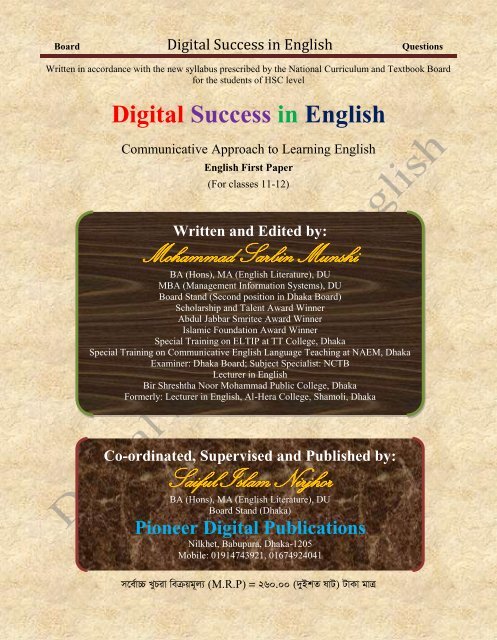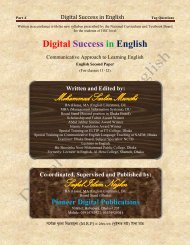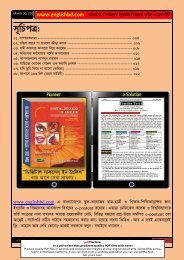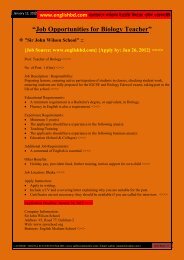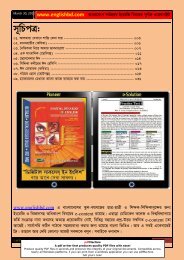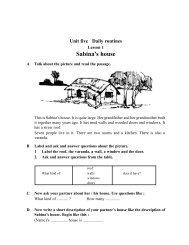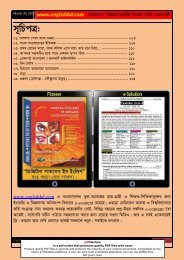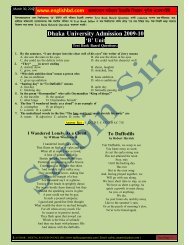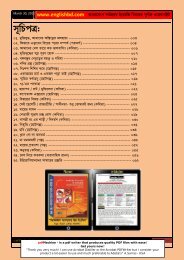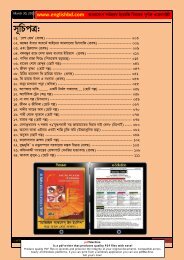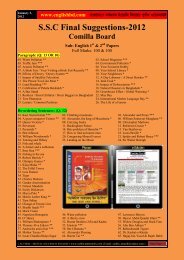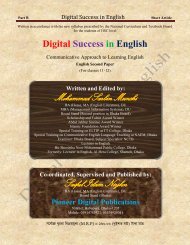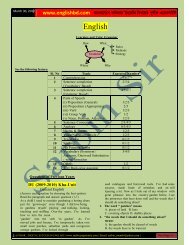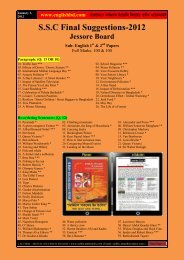Digital Success in English - englishbd.com
Digital Success in English - englishbd.com
Digital Success in English - englishbd.com
Create successful ePaper yourself
Turn your PDF publications into a flip-book with our unique Google optimized e-Paper software.
Board <strong>Digital</strong> <strong>Success</strong> <strong>in</strong> <strong>English</strong> Questions<br />
Written <strong>in</strong> accordance with the new syllabus prescribed by the National Curriculum and Textbook Board<br />
for the students of HSC level<br />
<strong>Digital</strong> <strong>Success</strong> <strong>in</strong> <strong>English</strong><br />
Communicative Approach to Learn<strong>in</strong>g <strong>English</strong><br />
<strong>English</strong> First Paper<br />
(For classes 11-12)<br />
Written and Edited by:<br />
Mohammad Sarb<strong>in</strong> Munshi<br />
BA (Hons), MA (<strong>English</strong> Literature), DU<br />
MBA (Management Information Systems), DU<br />
Board Stand (Second position <strong>in</strong> Dhaka Board)<br />
Scholarship and Talent Award W<strong>in</strong>ner<br />
Abdul Jabbar Smritee Award W<strong>in</strong>ner<br />
Islamic Foundation Award W<strong>in</strong>ner<br />
Special Tra<strong>in</strong><strong>in</strong>g on ELTIP at TT College, Dhaka<br />
Special Tra<strong>in</strong><strong>in</strong>g on Communicative <strong>English</strong> Language Teach<strong>in</strong>g at NAEM, Dhaka<br />
Exam<strong>in</strong>er: Dhaka Board; Subject Specialist: NCTB<br />
Lecturer <strong>in</strong> <strong>English</strong><br />
Bir Shreshtha Noor Mohammad Public College, Dhaka<br />
Formerly: Lecturer <strong>in</strong> <strong>English</strong>, Al-Hera College, Shamoli, Dhaka<br />
Co-ord<strong>in</strong>ated, Supervised and Published by:<br />
Saiful Islam Nirjhor<br />
BA (Hons), MA (<strong>English</strong> Literature), DU<br />
Board Stand (Dhaka)<br />
Pioneer <strong>Digital</strong> Publications<br />
Nilkhet, Babupura, Dhaka-1205<br />
Mobile: 01914743921, 01674924041<br />
m‡e©v”P LyPiv weµqg~j¨ (M.R.P) = 260.00 (`yBkZ lvU) UvKv gvÎ
Board <strong>Digital</strong> <strong>Success</strong> <strong>in</strong> <strong>English</strong> Questions<br />
2011 mv‡j †ev‡W©i cixÿvq Bs‡iwR‡Z †miv mvdj¨<br />
mv¤úªwZK GK Rwi‡c †`Lv hvq †h, ÒwWwRUvj mvK‡mm& Bb BswjkÓ eBwU c‡o 2011 mv‡ji<br />
GBP.Gm.wm. cixÿvq Bs‡iwR‡Z A+ †c‡q‡Q 65.5%, A †c‡q‡Q 33.3% Ges A- ‡c‡q‡Q<br />
1.2% A_©vr eBwU c‡o wkÿv_©x‡`i mvdj¨ kZfvM (65.5% + 33.3% + 1.2% = 100%)|<br />
Ab¨w`‡K, evRv‡i cÖPwjZ I cÖwZwôZ eB¸‡jv c‡o A+ wKsev A cvIqvi †iKW© 21% GiI Kg<br />
Ges A‡bK †ÿ‡ÎB wkÿv_©xiv Bs‡iwR‡Z AK…ZKvh© nq|<br />
―Pioneer <strong>Digital</strong> Publications‖ AZ¨šÍ Avb‡›`i mv‡_ Rvbv‡”Q †h, AwZ kxNªB evsjv‡`‡k<br />
me©cÖ_g Bs‡iwR wel‡qi c~Y©v½ website Pvjy Ki‡Z hv‡”Q hv wkÿv_x©‡`i‡K Bs‡iwR‡Z A+<br />
cvIqv‡bv mn Zv‡`i‡K AviI GK avc mvg‡b GwM‡q †b‡e ÒwWwRUvj evsjv‡`kÓ Movi j‡ÿ¨|<br />
wkÿv_©xMY www.<strong>englishbd</strong>.<strong>com</strong> wj‡L search w`‡jB website-wU †c‡q hv‡eb| ZvQvov,<br />
cieZ©x‡Z Bs‡iwRi Dci CD/DVD-I cvIqv hv‡e| eBwUi mxwgZ Kwc GLb bxj‡ÿ‡Z I<br />
dvg©‡M‡U cvIqv hv‡”Q| MZ eQi eBwUi me Kwc †kl n‡q hvevi ci A‡bK wkÿK I kZ kZ<br />
wkÿv_©x eva¨ n‡q wZb¸Y UvKvq d‡UvKwc Ki‡Z eva¨ n‡qwQ‡jv|
Board <strong>Digital</strong> <strong>Success</strong> <strong>in</strong> <strong>English</strong> Questions<br />
eB msMÖn Ki‡Z †hvMv‡hvM Kiæb:<br />
Publisher / Writer:<br />
Pioneer <strong>Digital</strong> Publications<br />
Mobile: 01914743921, 01674924041, 01714453667<br />
Copyright:<br />
All rights reserved by the author. No part of this book should be reproduced, stored <strong>in</strong> a<br />
retrieval system or transmitted <strong>in</strong> any means without the prior permission of the author.<br />
Pr<strong>in</strong>t & Edition:<br />
First Pr<strong>in</strong>t: July 2009<br />
First Edition: December 2009<br />
Second Edition: July 2010<br />
Third Edition: July 2011<br />
Available at:<br />
Nilkhet, Babupura<br />
Farmgate and other important places.<br />
N.B. Contact the publisher / writer for meet<strong>in</strong>g your local demand. To get your copy,<br />
order at least one week before.<br />
eBwU µ‡qi mgq mgvavb KwcwU ey‡S wbb|
Board <strong>Digital</strong> <strong>Success</strong> <strong>in</strong> <strong>English</strong> Questions<br />
Board Questions 2003<br />
DHAKA BOARD-2003<br />
Part A: Seen Comprehension (40 Marks)<br />
Read the passage below and answer the questions 1-4:<br />
Statistics show that about 350 million people speak <strong>English</strong> as a first language and another 300 million use<br />
it as a second language. It is the official or semi-official language <strong>in</strong> more than 60 countries and of many<br />
<strong>in</strong>ternational organisations. The International Olympic Committee, for example, always holds meet<strong>in</strong>gs <strong>in</strong><br />
<strong>English</strong>. <strong>English</strong> helps the <strong>in</strong>ternational <strong>com</strong>munity and bus<strong>in</strong>ess world to <strong>com</strong>municate across national<br />
borders. Today, more than 80% of all the <strong>in</strong>formation <strong>in</strong> the world‘s <strong>com</strong>puters is <strong>in</strong> <strong>English</strong>. So,<br />
organisations frequently need employees who speak and write a standard form of <strong>English</strong>. In fact, some<br />
<strong>com</strong>panies provide <strong>English</strong> language tra<strong>in</strong><strong>in</strong>g for their staff. It is, therefore, little wonder that job<br />
advertisements nowadays often ask for a ‗good work<strong>in</strong>g knowledge‘ of <strong>English</strong>. Many believe now that<br />
<strong>English</strong> usually helps them to get good jobs and better salaries.<br />
[Unit-3, Lesson-2]<br />
1. Choose the right word/expression to <strong>com</strong>plete each sentence. 1 x 5 = 5<br />
(a) First language means the (important/ma<strong>in</strong>/natural) language.<br />
(b) A second language is one that is taught and learnt regard<strong>in</strong>g it as next <strong>in</strong> importance to (the mother<br />
tongue/a foreign language/ a dead language).<br />
(c) The number of people who use <strong>English</strong> as a second language is about (300/350/250) million.<br />
(d) International Olympic Committee always holds its meet<strong>in</strong>gs <strong>in</strong> (French/<strong>English</strong>/Spanish).<br />
(e) <strong>English</strong> is used as official or semi-official language <strong>in</strong> more than (60/50/70) countries.<br />
2. True/false if false, give the correct <strong>in</strong>formation. 1 x 5 = 5<br />
(a) Nowadays more than eighty per cent of all the <strong>in</strong>formation <strong>in</strong> the world‘s <strong>com</strong>puters is <strong>in</strong> <strong>English</strong>.<br />
(b) Many nowadays get good jobs because they know <strong>English</strong>.<br />
(c) Many <strong>in</strong>ternational organisations often use different languages.<br />
(d) A good knowledge of <strong>English</strong> is necessary for a good job.<br />
(e) No <strong>com</strong>panies arrange tra<strong>in</strong><strong>in</strong>g for their staff to make them able to use <strong>English</strong> well.<br />
3. Fill <strong>in</strong> the gaps with the correct form of the words <strong>in</strong> brackets. Add any preposition if necessary. 5<br />
(a) Statistics show that <strong>English</strong> is (speak) —— as a first language by 350 million people.<br />
(b) The International Olympic Committee (use) —— <strong>English</strong> <strong>in</strong> its meet<strong>in</strong>gs.<br />
(c) <strong>English</strong> (help) —— <strong>com</strong>munication across national borders.<br />
(d) More than 80% of all the <strong>in</strong>formation <strong>in</strong> the world‘s <strong>com</strong>puters (be) —— <strong>in</strong> <strong>English</strong>.<br />
(e) Employers nowadays want applicants (have) —— a good work<strong>in</strong>g knowledge of <strong>English</strong>.<br />
4. Make a list of five reasons why <strong>English</strong> is important. 1 x 5 = 5<br />
Read the passage below and answer questions 5-8:<br />
Two friends, Raghib and Adeeb, wanted to learn how to ride a cycle. Adeeb bought a book called ―How to<br />
Ride a Cycle‖ and started read<strong>in</strong>g it. On the other hand, Raghib took out his cycle on the street and started<br />
try<strong>in</strong>g to ride it. He fell off several times and Adeeb laughed at him. However, by the time Adeeb f<strong>in</strong>ished<br />
the first chapter of his book, Raghib was rid<strong>in</strong>g his cycle fairly well. Adeeb knew how the cycle worked<br />
but did not know how to use it. Raghib did not need to know everyth<strong>in</strong>g about how his cycle worked but<br />
he knew how to use it from first-hand experience.
Board <strong>Digital</strong> <strong>Success</strong> <strong>in</strong> <strong>English</strong> Questions<br />
Learn<strong>in</strong>g a language is like rid<strong>in</strong>g a cycle. The most important th<strong>in</strong>g about any language is<br />
<strong>com</strong>munication. You learn to <strong>com</strong>municate effectively by us<strong>in</strong>g a language, by do<strong>in</strong>g th<strong>in</strong>gs with it, and<br />
by experienc<strong>in</strong>g it. You can learn <strong>English</strong> <strong>in</strong> the same way that Raghib learnt to ride a cycle. Don‘t worry<br />
if people laugh at you when you make mistakes. You can certa<strong>in</strong>ly learn through mistakes.<br />
[Unit-3; Lesson-3]<br />
5. Write short answer to the follow<strong>in</strong>g questions. 1 x 5 = 5<br />
(a) What did Raghib and Adeeb want to do<br />
(b) What did Raghib do to learn how to ride a cycle<br />
(c) What did Adeeb know by the time Raghib had learnt to ride his bicycle fairly well<br />
(d) How is learn<strong>in</strong>g a language like learn<strong>in</strong>g how to ride a bicycle<br />
(e) What should you not do if people laugh at you when you make mistakes<br />
6. Fill <strong>in</strong> the gaps with suitable words. 1 x 5 = 5<br />
Karim, a student, wanted to (a) —— a bicycle and bought a book entitled ‗How to Ride a Bicycle‘. He<br />
read it for several days but did not get much help from it. Then he carefully watched a friend gett<strong>in</strong>g on<br />
his bicycle and (b) —— it. The next day he took out his new bicycle and tried to ride it. He failed<br />
several times but <strong>in</strong> two days he succeeded <strong>in</strong> rid<strong>in</strong>g his bicycle. After a few days he was able to ride his<br />
bicycle quite (c) ——. One day someone told him that learn<strong>in</strong>g a language was like (d) —— to ride a<br />
bicycle. From that day on he started to note how people arrange words to make sentences. He also read<br />
a few story books, not<strong>in</strong>g the arrangement of words <strong>in</strong> the stories. Then he started to speak and write<br />
<strong>English</strong>. He made many (e) —— but he did not lose heart. F<strong>in</strong>ally, he learnt to speak and write simple<br />
correct <strong>English</strong>.<br />
7. Summarise what Raghib and Adeeb did to learn how to ride a bicycle <strong>in</strong> five sentences. 1 x 5 = 5<br />
8. Based on your read<strong>in</strong>g of the passage, make short notes <strong>in</strong> each of the boxes <strong>in</strong> the flow chart<br />
show<strong>in</strong>g how a language can be learnt. (No. 1 has been done for you) 1 x 5 = 5<br />
1<br />
Learn<strong>in</strong>g<br />
a language<br />
2 3 4 5 6<br />
<br />
Part-B: Vocabulary (20 Marks)<br />
9. Fill <strong>in</strong> the gaps with suitable words from the box (make any grammatical change if necessary).<br />
There are more words <strong>in</strong> the box than you need. 1x10=10<br />
add breathe need plant prevent preserve grow<br />
produce protect provide take give wash gather<br />
Trees are very useful to humans. They (a) —— the rich top soil from be<strong>in</strong>g (b) —— away by ra<strong>in</strong>water<br />
and floods. You can see trees be<strong>in</strong>g (c) —— along mounta<strong>in</strong> slopes, on roadsides, <strong>in</strong> parks and gardens.<br />
Trees give us shade. They (d) —— life to a place with their colourful flowers, beautiful leaves, fruits<br />
and thick trunks. They (e) —— shelters for birds and animals. They give us timber, medic<strong>in</strong>es, paper,<br />
gum and many other useful th<strong>in</strong>gs. They (f) —— <strong>in</strong> carbon dioxide and (g) —— oxygen. As you know<br />
by now man (h) —— oxygen to (i) —— and live. Trees are our best friends. We should (j) —— them<br />
and plant more trees around us.<br />
10. Fill <strong>in</strong> the blanks with an appropriate word <strong>in</strong> each gap. 1x10=10<br />
Hous<strong>in</strong>g is one of the (a) —— problems of our (b) ——. Thousands of people <strong>in</strong> big (c) —— like<br />
Dhaka and Chittagong dwell on the footpaths. In rural (d) —— also there is an acute (e) —— of houses.<br />
The cost of construction is (f) —— everyday. At present it is very (g) —— for the <strong>com</strong>mon (h) —— to<br />
afford the (i) —— of construction. This problem needs to be (j) —— immediately.
Board <strong>Digital</strong> <strong>Success</strong> <strong>in</strong> <strong>English</strong> Questions<br />
Part-C: Guided Writ<strong>in</strong>g (40 Marks)<br />
11. Match the phrases <strong>in</strong> the follow<strong>in</strong>g substitution table to make sensible sentences. Write out the<br />
sentences <strong>in</strong> full. 6x2=12<br />
A B C D<br />
(i) All of you raised the greatest man and fearful.<br />
(ii) He have heard to conquer to a high position.<br />
(iii) His good work and courage rema<strong>in</strong>ed the name of <strong>in</strong> the country.<br />
(iv) His mission became him Napoleon.<br />
(v) He was the French army the neighbour<strong>in</strong>g countries.<br />
(vi) France under him entered very powerful as an ord<strong>in</strong>ary soldier.<br />
12. The sentences <strong>in</strong> the follow<strong>in</strong>g text are jumbled. Rewrite the sentences <strong>in</strong> the proper order to<br />
make a <strong>com</strong>plete story. 14<br />
(i) He was born <strong>in</strong> Jilan <strong>in</strong> Iraq.<br />
(ii) She was very pious and taught him many important and religious th<strong>in</strong>gs.<br />
(iii) Hazrat Abdul Quader was a famous religious figure <strong>in</strong> Islam.<br />
(iv) His mother decided to send him to Baghdad with a view to educat<strong>in</strong>g him there.<br />
(v) His father died even before his birth.<br />
(vi) The boy left for Baghdad with a caravan of merchants, but on their way a gang of robbers fell upon<br />
them and looted their money.<br />
(vii) That time the roads were unsafe; often gangs of robbers fell upon the travellers and plundered their<br />
belong<strong>in</strong>gs and money.<br />
(viii) One of the robbers said, the small boy might have someth<strong>in</strong>g with him.<br />
(ix) At the time of send<strong>in</strong>g, his mother sewed forty gold co<strong>in</strong>s <strong>in</strong> his shirt and advised him never to tell a lie.<br />
(x) The boy said, ―Mother has advised me never to tell a lie even <strong>in</strong> danger.‖<br />
(xi) The leader felt surprised and said, ―You might not have disclosed the fact.‖<br />
(xii) Boy Abdul Quader spoke out, ―No, no, I have forty gold co<strong>in</strong>s sewed <strong>in</strong> my shirt.‖<br />
(xiii) The robbers felt ashamed of their deeds and gave up robbery.<br />
(xiv) The gang leader said that perhaps the boy had noth<strong>in</strong>g with him.<br />
13. Write a paragraph of about 100 words based on the follow<strong>in</strong>g questions. Your answers to the<br />
questions should give as much detail as possible. 14<br />
How did you celebrate the Eid-ul-Fitr this year<br />
What did you f<strong>in</strong>d your mother and sisters do<strong>in</strong>g <strong>in</strong> the morn<strong>in</strong>g of the Eid day<br />
What did you do <strong>in</strong> the morn<strong>in</strong>g<br />
What did you f<strong>in</strong>d when you went to the Eidgah<br />
What k<strong>in</strong>d of feast was arranged at your residence for the occasion<br />
How did you spend the afternoon<br />
RAJSHAHI BOARD-2003<br />
Part A: Seen Comprehension (40 Marks)<br />
Read the passage below and answer questions 1-4:<br />
‗Communicative <strong>com</strong>petence‘ refers to the ability to use language appropriately <strong>in</strong> different<br />
circumstances. There are two ways of develop<strong>in</strong>g <strong>com</strong>municative <strong>com</strong>petence <strong>in</strong> a language. The first is<br />
acquisition, which is similar to the way people develop ability <strong>in</strong> their mother tongue. It is a natural,<br />
subconscious process <strong>in</strong> which users are not usually aware of acquir<strong>in</strong>g a language. They are aware only
Board <strong>Digital</strong> <strong>Success</strong> <strong>in</strong> <strong>English</strong> Questions<br />
of the fact that they are us<strong>in</strong>g the language to <strong>com</strong>municate. In non-technical terms, acquisition is ‗pick<strong>in</strong>g<br />
up‘ a language spontaneously. It may also be called ‗implicit‘ learn<strong>in</strong>g.<br />
On the other hand, the second way of develop<strong>in</strong>g <strong>com</strong>municative <strong>com</strong>petence <strong>in</strong> a language is learn<strong>in</strong>g<br />
that language. It refers to conscious knowledge of a second language, know<strong>in</strong>g the rules of language use,<br />
be<strong>in</strong>g aware of them and be<strong>in</strong>g able to talk about them. In non-technical terms, learn<strong>in</strong>g is to know<br />
consciously about a language. It may be described as ‗explicit‘ learn<strong>in</strong>g.<br />
Language specialists believe that acquir<strong>in</strong>g a language is more successful and longer last<strong>in</strong>g than learn<strong>in</strong>g.<br />
Therefore, teachers these days encourage learners of a second language to practice and experience the<br />
language <strong>in</strong> different situations where they are <strong>in</strong>volved <strong>in</strong> <strong>com</strong>municat<strong>in</strong>g with others. And that is exactly<br />
what the tasks <strong>in</strong> this book are designed to do.<br />
[Unit-3, Lesson-1]<br />
1. Choose the right word to <strong>com</strong>plete each sentence. 1 x 5 = 5<br />
(a) Communicative <strong>com</strong>petence (<strong>in</strong>dicates/defers/discourages) the ability to use language appropriately.<br />
(b) Communicative <strong>com</strong>petence can be (developed/mastered/development) <strong>in</strong> two ways.<br />
(c) Language specialists believe that learn<strong>in</strong>g a language is not so successful (as/like/than) acquir<strong>in</strong>g it.<br />
(d) Acquisition (likens/clashes/relates) to the way people develop ability <strong>in</strong> their mother tongue.<br />
(e) Learn<strong>in</strong>g is someth<strong>in</strong>g (natural/explicit/implicit).<br />
2. True/False If false, give the correct <strong>in</strong>formation. 1 x 5 = 5<br />
(a) We are acquir<strong>in</strong>g <strong>English</strong>.<br />
(b) People learn a second language unconsciously.<br />
(c) The passage shows the difference between acquisition and learn<strong>in</strong>g.<br />
(d) Acquisition is easier than learn<strong>in</strong>g.<br />
(e) Explicit learn<strong>in</strong>g is a subconscious process.<br />
3. Fill <strong>in</strong> the gaps with the correct form of the words <strong>in</strong> brackets. Add prepositions if necessary. 5<br />
(a) The power of (use) —— language properly means <strong>com</strong>municative <strong>com</strong>petence.<br />
(b) Every person learns his or her mother tongue (natural) ——.<br />
(c) Learners of a second language are (encourage) —— their teachers.<br />
(d) Pick<strong>in</strong>g up means (spontaneously) —— learn<strong>in</strong>g of a language.<br />
(e) The (believe) —— the language specialists is right.<br />
4. Make a list of five th<strong>in</strong>gs about develop<strong>in</strong>g <strong>com</strong>municative <strong>com</strong>petence <strong>in</strong> a second language. 5<br />
Read the passage below and answer questions 5-8:<br />
There have been significant changes <strong>in</strong> the types of enterta<strong>in</strong>ment over time. Many of these no longer<br />
exist. Even if they do, people keep look<strong>in</strong>g for newer forms of enterta<strong>in</strong>ment. Thus snake charm<strong>in</strong>g,<br />
puppet shows, jatra, jarigan, sharigan and kabigan which were <strong>com</strong>mon forms of enterta<strong>in</strong>ment <strong>in</strong> the past,<br />
have almost lost their appeal. Radio, which was used to be a good source of enterta<strong>in</strong>ment <strong>in</strong> the past, is<br />
now giv<strong>in</strong>g place to television and to satellite channels <strong>in</strong> particular. The enterta<strong>in</strong>ment bus<strong>in</strong>ess, like other<br />
spheres of life, is gett<strong>in</strong>g westernised day by day. Folk music palligeeti is now sung with western<br />
<strong>in</strong>struments. At the same time, modern music is now fus<strong>in</strong>g melodies from folk and traditional songs. In<br />
general, band and pop music are be<strong>com</strong><strong>in</strong>g more and more popular, particularly among the young<br />
generation.<br />
Sport has be<strong>com</strong>e a great source of enterta<strong>in</strong>ment today. Football, which used to be the most popular<br />
spectator sport <strong>in</strong> Bangladesh, is gradually be<strong>in</strong>g replaced by cricket as a popular form of sports<br />
enterta<strong>in</strong>ment.<br />
[Unit-10, Lesson-4]<br />
5. Write short answers to the follow<strong>in</strong>g questions about enterta<strong>in</strong>ment. 1 x 5 = 5<br />
(a) Is there any change <strong>in</strong> the field of enterta<strong>in</strong>ment <strong>in</strong> our country<br />
(b) What were the <strong>com</strong>mon forms of enterta<strong>in</strong>ment <strong>in</strong> the past
Board <strong>Digital</strong> <strong>Success</strong> <strong>in</strong> <strong>English</strong> Questions<br />
(c) What is the position of radio now<br />
(d) Are the <strong>com</strong>mon forms of enterta<strong>in</strong>ment popular as before<br />
(e) Which sport is gradually tak<strong>in</strong>g the place of football<br />
6. Fill <strong>in</strong> each gap with suitable words. 1 x 5 = 5<br />
Change is the (a) —— of the day. Everyth<strong>in</strong>g (b) —— <strong>in</strong> course of time. What is new today will grow<br />
old tomorrow. In the same way we notice changes <strong>in</strong> the matter of (c) ——. At present our people f<strong>in</strong>d<br />
little (d) —— <strong>in</strong> jarigan, sharigan and kabigan. Our melodious and mean<strong>in</strong>gful Bangla songs are<br />
yield<strong>in</strong>g place (e) —— the vociferous pop songs.<br />
7. Summarise the passage <strong>in</strong> five sentences. 1 x 5 = 5<br />
8. On the basis of your read<strong>in</strong>g of the passage, make a short note <strong>in</strong> each of the boxes <strong>in</strong> the flow<br />
chart show<strong>in</strong>g how changes are tak<strong>in</strong>g place <strong>in</strong> the sphere of enterta<strong>in</strong>ment. (No. 1 has been done for<br />
you) 1 x 5 = 5<br />
Noticeable<br />
changes <strong>in</strong> the<br />
forms of<br />
enterta<strong>in</strong>ment<br />
2 3 4 5 6<br />
<br />
Part-B: Vocabulary (20 Marks)<br />
9. Fill <strong>in</strong> the gaps with suitable words from the box (make any grammatical change if necessary).<br />
There are more words <strong>in</strong> the box than you need. 1x10=10<br />
veil knock look<strong>in</strong>g saw sweet perfection dress<br />
trade aga<strong>in</strong>st th<strong>in</strong>k<strong>in</strong>g <strong>in</strong>deed perfect live beautiful<br />
Once upon a time there (a) —— <strong>in</strong> the city of Bagdad a young bachelor who was by (b) —— a porter.<br />
One day he sat <strong>in</strong> the market place lean<strong>in</strong>g idly (c) —— his basket. A young woman (d) —— <strong>in</strong> rare<br />
silks and cloaked <strong>in</strong> a gold-embroidered mantle, stopped before him and gently raised her (e) ——.<br />
Beneath it there showed dark eyes with long lashes and l<strong>in</strong>eaments of (f) —— beauty. ―Lift up your<br />
basket, porter,‖ she said <strong>in</strong> a (g) —— voice, ―and follow me.‖ At once the porter took up his basket, (h)<br />
—— to himself. ―This is (i) —— a lucky day!‖ He followed her until she stopped at the door of a house<br />
and (j) ——.<br />
10. Fill <strong>in</strong> each blank with an appropriate word. 1x10=10<br />
One day a grocer borrowed a balance and weights from a fruit-seller. After a few days the fruit-seller<br />
asked the grocer to (a) —— his balance and weights to him. The grocer said, ―I am sorry to say that the<br />
mice ate away your balance and weights.‖ The fruit-seller became very (b) —— at the (c) —— excuse<br />
of the dishonest grocer. Then one day the fruit-seller said to the grocer, ―I am (d) —— to the town to do<br />
some shopp<strong>in</strong>g. Please send your son with me to (e) —— my th<strong>in</strong>gs. We will <strong>com</strong>e back tomorrow.‖ So<br />
the grocer (f) —— his son with the fruit-seller. The next day the fruit-seller returned alone from the<br />
town. ―Where is my son‖ asked the grocer. ―A crow carried your son away,‖ replied the fruit-seller.<br />
―How can a crow (g) —— away such a big boy‖ the grocer shouted angrily. ―Just the same way as the<br />
mice can (h) —— away the balance and weights,‖ said the fruit-seller. The grocer (i) —— the po<strong>in</strong>t. He<br />
returned the balance and weights to the fruit-seller. Then the fruit-seller sent the boy (j) —— to his<br />
father.<br />
Part-C: Guided Writ<strong>in</strong>g (40 Marks)<br />
11. Match the phrases <strong>in</strong> the follow<strong>in</strong>g substitution table to make sensible sentences. Write out the<br />
sentences <strong>in</strong> full. 6x2=12
Board <strong>Digital</strong> <strong>Success</strong> <strong>in</strong> <strong>English</strong> Questions<br />
A B C D<br />
(i) The ancient<br />
mar<strong>in</strong>er<br />
opened fly<strong>in</strong>g until they arrived <strong>in</strong> cold grey<br />
seas.<br />
(ii) He and the be<strong>in</strong>g the marriage guest towards the ship.<br />
other sailors<br />
(iii) The big white an albatross as a bird of good omen.<br />
sails of their ship<br />
(iv) The weather told very cold, there were about his last journey on the sea.<br />
(v) One day the<br />
sailors saw<br />
wel<strong>com</strong>ed it to the south blew them quickly through icy<br />
waters.<br />
(vi) All of them sailed away wide, as the strong w<strong>in</strong>d no birds or animals <strong>in</strong> the sea.<br />
12. The sentences <strong>in</strong> the follow<strong>in</strong>g text are jumbled. Rewrite the sentences <strong>in</strong> the proper order to<br />
make a <strong>com</strong>plete story. 14<br />
(i) They looked for him here and there for sometime.<br />
(ii) Once the queen of Belgium <strong>in</strong>vited him to Brussels.<br />
(iii) So they went back to the queen and <strong>in</strong>formed her that E<strong>in</strong>ste<strong>in</strong> had not <strong>com</strong>e by tra<strong>in</strong>.<br />
(iv) ―I did not th<strong>in</strong>k that anybody would send a car for me,‖ replied the great scientist with a smile.<br />
(v) But understandably, they failed to f<strong>in</strong>d him out.<br />
(vi) E<strong>in</strong>ste<strong>in</strong>, the great scientist, was simple <strong>in</strong> his ways of life.<br />
(vii) He travelled to Brussels by tra<strong>in</strong> and got down at the station.<br />
(viii) ―But I can assure you that I have greatly enjoyed the walk,‖ said E<strong>in</strong>ste<strong>in</strong>.<br />
(ix) They never imag<strong>in</strong>ed that this shabby man would be E<strong>in</strong>ste<strong>in</strong> himself.<br />
(x) E<strong>in</strong>ste<strong>in</strong>, however walked the whole way with a suitcase <strong>in</strong> one hand and a viol<strong>in</strong> <strong>in</strong> the other.<br />
(xi) The officials also expected to see somebody who was rich and aristocratic.<br />
(xii) The queen was highly amazed at his simplicity.<br />
(xiii) But he could not th<strong>in</strong>k that many gorgeously dressed officials had <strong>com</strong>e to receive him at the station.<br />
(xiv) When he reached the dest<strong>in</strong>ation, the queen said to him, ―I sent a car for you, Dr. E<strong>in</strong>ste<strong>in</strong>.‖<br />
13. Write a paragraph of around 100 words based on the follow<strong>in</strong>g questions. Your answers should<br />
give as much detail as possible. 14<br />
Do you support unfair means <strong>in</strong> the exam<strong>in</strong>ation<br />
Why are you aga<strong>in</strong>st it<br />
Why, accord<strong>in</strong>g to you, do the students adopt unfair means<br />
What measure have the authorities recently taken to prevent unfair means <strong>in</strong> the exam<strong>in</strong>ation<br />
Describe the good effects of the preventive measures.<br />
COMILLA BOARD-2003<br />
Part A: Seen Comprehension (40 Marks)<br />
Read the Passage below and answer the questions 1-4:<br />
Humans, animals and plants are all important elements of the natural environment. But humans are cruelly<br />
destroy<strong>in</strong>g plants and animals and thereby creat<strong>in</strong>g a danger for us all. The destruction of forests and other<br />
habitats is caus<strong>in</strong>g the ext<strong>in</strong>ction of various plants and animals every day. These losses are particularly<br />
severe <strong>in</strong> the areas of tropical forest which cover only 7% of the surface of the globe, but which provide<br />
the liv<strong>in</strong>g space for between 50% and 80% of all our wildlife. Many wild animals and birds such as<br />
pandas, bears, tigers, alligators, whales, wolves, eagles, falcons, kites and buzzards are faced with the<br />
threat of ext<strong>in</strong>ction today. Their decl<strong>in</strong>e has been accelerated by the destruction of their feed<strong>in</strong>g and
Board <strong>Digital</strong> <strong>Success</strong> <strong>in</strong> <strong>English</strong> Questions<br />
nest<strong>in</strong>g places, by the collection of eggs, and above all by the widespread use of chemicals and pesticides<br />
which enter their food cha<strong>in</strong>s lead<strong>in</strong>g to sterility and mass deaths. Hunt<strong>in</strong>g of birds and animals is another<br />
cause of their ext<strong>in</strong>ction. Men kill birds for food and feathers, hunt big cats to make fur coats and<br />
slaughter alligators and other reptiles for shoes and bags. In addition, whale hunt<strong>in</strong>g has also drastically<br />
reduced the number of blue whales <strong>in</strong> the Atlantic Ocean.<br />
[Unit-6; Lesson-4]<br />
1. Choose the right word to <strong>com</strong>plete each sentence. 1 x 5 = 5<br />
(a) Humans are destroy<strong>in</strong>g plants and animals which are (good/useful/dangerous) to us.<br />
(b) The tropical forests cover about (70/17/7) per cent of the surface of the earth.<br />
(c) Most of the wild animals live <strong>in</strong> the (tropical/subtropical/coastal) forests.<br />
(d) Hunt<strong>in</strong>g of birds is a cause of their (destruction/<strong>in</strong>crease/ext<strong>in</strong>ction).<br />
(e) Whale hunt<strong>in</strong>g has reduced the number of blue whales <strong>in</strong> the (Indian/Pacific/Atlantic) Ocean.<br />
2. True/false If false, give the correct <strong>in</strong>formation. 1 x 5 = 5<br />
(a) Humans, animals and plants are ord<strong>in</strong>ary elements of natural environment.<br />
(b) Losses of plants and animals are severe <strong>in</strong> the tropical region.<br />
(c) Men kill birds for food and feathers.<br />
(d) In order to protect environment, we should not protect our wildlife.<br />
(e) Sterility among the birds is caused by destruction of forests.<br />
3. Fill <strong>in</strong> the gaps with the correct form of the words <strong>in</strong> brackets. Add any preposition if necessary. 5<br />
(a) (Destroy) —— forests has a very bad effect on the wild animals.<br />
(b) They (lose) —— their breed<strong>in</strong>g places.<br />
(c) Their food cha<strong>in</strong> is also (affect) —— the widespread use of chemicals.<br />
(d) Many wild animals (face) —— with the threat of ext<strong>in</strong>ction.<br />
(e) (Hunt) —— animals should be restricted by the government.<br />
4. Match the words/phrases of Column A with the ones of Column B and put them <strong>in</strong> <strong>com</strong>plete<br />
sentences. 1 x 5 = 5<br />
Column A<br />
Column B<br />
(a) Their decl<strong>in</strong>e has been accelerated<br />
(i) we should protect our wildlife.<br />
(b) Hunt<strong>in</strong>g of birds and animals is<br />
(ii) is to be k<strong>in</strong>d to mank<strong>in</strong>d.<br />
(c) In order to protect our environment<br />
(iii) drastically reduced.<br />
(d) To be k<strong>in</strong>d to animals<br />
(iv) by destruction of their habitat.<br />
(e) Whale hunt<strong>in</strong>g has also<br />
(v) another cause of their ext<strong>in</strong>ction.<br />
(vi) threat of ext<strong>in</strong>ction today.<br />
Read the passage below and answer questions 5-8:<br />
When you are cross<strong>in</strong>g the road and your vehicle gets stuck <strong>in</strong> a seem<strong>in</strong>gly never-end<strong>in</strong>g jam <strong>in</strong> Dhaka<br />
city, every few m<strong>in</strong>utes a boy or girl <strong>com</strong>es to you and tries to sell a bunch of roses or rajanigandha say<strong>in</strong>g<br />
―Bhaiya (or Apa depend<strong>in</strong>g on your gender) ei koita ful niya jan (please buy these flowers)‖. They do not<br />
tire and will pursue you relentlessly, at least as long as the jam lasts. If you are alone, they will say that<br />
you must take the flowers for their bhabis — mean<strong>in</strong>g your girlfriend or wife. You often get annoyed at<br />
their ways and shout at them. It has very little effect and often you are forced to accept their demand and<br />
console yourself by th<strong>in</strong>k<strong>in</strong>g that it was after all a good barga<strong>in</strong>. However, how they manage to sell the<br />
flowers at such a cheap price really bewilders you. And they are not very forth<strong>com</strong><strong>in</strong>g with their answers,<br />
if you ask them.<br />
These kids are seen <strong>in</strong> some particular spots of the city. The Sheraton and the Panthapath roads of Dhaka<br />
city are two such places. Invariably, you may f<strong>in</strong>d an <strong>in</strong>terest<strong>in</strong>g character or two among them. There is<br />
this guy who is someth<strong>in</strong>g of a sardar among the flower peddlers at Kawran Bazar. He is perhaps the<br />
smallest of the bunch but he rules his disciples with an iron hand.<br />
[Unit-20; Lesson-4]
Board <strong>Digital</strong> <strong>Success</strong> <strong>in</strong> <strong>English</strong> Questions<br />
5. Write short answer to the follow<strong>in</strong>g questions about the flower peddlers. 1 x 5 = 5<br />
(a) What request will the flower peddler make to you<br />
(b) Why will you often get annoyed<br />
(c) Where are they generally seen<br />
(d) What may have caused them to sell flowers<br />
(e) Do you feel pity for them Why<br />
6. Fill <strong>in</strong> the gaps with suitable words. 1 x 5 = 5<br />
In Bangladesh, the exist<strong>in</strong>g law cannot (a) —— the child oppression. The children have to (b) ——<br />
their own livelihood. In (c) —— spots of Dhaka city one can see young boys and girls sell<strong>in</strong>g flowers <strong>in</strong><br />
the (d) —— jam. It is very (e) —— that we can‘t ensure them a better life.<br />
7. Summarize the struggles of the street children. 1 x 5 = 5<br />
8. Based on your read<strong>in</strong>g of the passage, make short notes <strong>in</strong> each of the boxes <strong>in</strong> the flow chart<br />
show<strong>in</strong>g struggles of life of the flower peddlers. (No. 1 has been done for you) 1 x 5 = 5<br />
Poverty, their<br />
constant<br />
<strong>com</strong>panion<br />
2 3 4 5 6<br />
<br />
Part-B: Vocabulary (20 Marks)<br />
9. Fill <strong>in</strong> the gaps with suitable words from the box (make any grammatical change if necessary).<br />
There are more words <strong>in</strong> the box than you need. 1x10=10<br />
flower job farm<strong>in</strong>g rais<strong>in</strong>g also sectors means<br />
opportunities engage create oneself easily rear<strong>in</strong>g many<br />
Self-employment means to create (a) —— opportunity for (b) —— by one‘s own effort. Various<br />
government organizations are try<strong>in</strong>g to (c) —— a congenial atmosphere for self-employment. Different<br />
NGO‘s have (d) —— rendered their help. Livestock (e) ——, agricultural (f) ——, poultry (g) —— are<br />
some of the (h) ——. There are many (i) —— for self-employment <strong>in</strong> Bangladesh. One can (j) ——<br />
engage oneself <strong>in</strong> these jobs.<br />
10. Fill <strong>in</strong> the blanks with an appropriate word <strong>in</strong> each gap. 1x10=10<br />
Money is power and can do much good and evil. It gives (a) —— and delight. It (b) —— do everyth<strong>in</strong>g.<br />
A person without (c) —— is a person to be pitied. Nobody pays (d) —— respect to him. His friends do<br />
not (e) —— him. He has to depend on the (f) —— of others. In order to (g) —— money, he does a lot<br />
of jobs. It is a must (h) —— our life. But it does not necessarily (i) —— happ<strong>in</strong>ess. Happ<strong>in</strong>ess is<br />
absolutely a (j) —— matter.<br />
Part-C: Guided Writ<strong>in</strong>g (40 Marks)<br />
11. Match the phrases <strong>in</strong> the follow<strong>in</strong>g substitution table to make sensible sentences. Write out the<br />
sentences <strong>in</strong> full. 6x2=12<br />
A B C D<br />
(i) Deprivation of basic human <strong>in</strong> the develop<strong>in</strong>g three dimensions of <strong>in</strong> Bangladesh.<br />
needs<br />
countries poverty ---<br />
(ii) There live do not have of poverty.<br />
(iii) The consequences of it is probably hunger is often deadly enough food to eat.<br />
(iv) 8 hundred million people is also wide<br />
spread and<br />
low life expectancy social, economic<br />
and political.<br />
(v) Poverty are the universal def<strong>in</strong>ition <strong>in</strong> this country.<br />
(vi) About 45% of the people are under acute poverty and illiteracy.
Board <strong>Digital</strong> <strong>Success</strong> <strong>in</strong> <strong>English</strong> Questions<br />
12. The sentences <strong>in</strong> the follow<strong>in</strong>g text are jumbled. Re-write the sentences <strong>in</strong> the proper order and<br />
<strong>in</strong> a cont<strong>in</strong>uous paragraph to make a story. 1x14=14<br />
(i) The hare was always proud of his speed.<br />
(ii) The next day the hare and the tortoise reached the venue.<br />
(iii) One day he challenged the tortoise to defeat him <strong>in</strong> a race.<br />
(iv) The hare ran very swiftly.<br />
(v) Long ago there lived a hare <strong>in</strong> a forest.<br />
(vi) They got ready.<br />
(vii) The hare always teased the tortoise.<br />
(viii) Cover<strong>in</strong>g much, the hare took rest.<br />
(ix) A tortoise also lived nearby.<br />
(x) They went to a fox and wanted him to act as a judge.<br />
(xi) He decided to take rest for sometime.<br />
(xii) The tortoise accepted the challenge.<br />
(xiii) As the fox waved the flag, the two started runn<strong>in</strong>g.<br />
(xiv) But the tortoise ran very slowly.<br />
13. Write a paragraph of about 100 words based on the follow<strong>in</strong>g questions. Your answers to the<br />
questions should give as much detail as possible. 14<br />
What‘s your idea about leisure<br />
How do village and city people spend their leisure<br />
What are the <strong>com</strong>mon sports and pastimes<br />
What do you know about the late w<strong>in</strong>ter activities of the people<br />
How do you evaluate travell<strong>in</strong>g<br />
JESSORE BOARD-2003<br />
Part A: Seen Comprehension (40 Marks)<br />
Read the passage below and answer questions 1-4:<br />
Globalisation has be<strong>com</strong>e a buzzword <strong>in</strong> the new era of <strong>in</strong>ternational relations. Basically, it is a process of<br />
expand<strong>in</strong>g trade and <strong>com</strong>merce all over the world by creat<strong>in</strong>g a borderless market. But it has had a farreach<strong>in</strong>g<br />
effect on many aspects of life. With the development of hi-tech <strong>com</strong>munication media and rapid<br />
transportation facilities, the world has <strong>com</strong>e closer. We can now learn <strong>in</strong> an <strong>in</strong>stant what is happen<strong>in</strong>g <strong>in</strong><br />
the farthest corner of the world and travel to any country <strong>in</strong> the shortest possible time. Countries of the<br />
world are like families <strong>in</strong> a village. They can even share their joys and sorrows like next-door neighbours.<br />
If one country is <strong>in</strong> distress, others can immediately <strong>com</strong>e to its assistance. If we could build up an<br />
atmosphere of mutual understand<strong>in</strong>g and co-operation through this globalisation process, our<br />
world could certa<strong>in</strong>ly be a better place to live <strong>in</strong>.<br />
[Unit-21, Lesson-1]<br />
1. Choose the best answer from the alternatives. 1 x 5 = 5<br />
(a) Globalisation has <strong>in</strong>fluenced our life very (slightly/easily/widely/mildly).<br />
(b) Now a country <strong>in</strong> distress can immediately be (attacked/advised/helped/criticised) by the others.<br />
(c) It is very (important/easy/difficult/nice) to know what is happen<strong>in</strong>g <strong>in</strong> other parts of the world.<br />
(d) Globalisation aims at (expand<strong>in</strong>g/creat<strong>in</strong>g/establish<strong>in</strong>g/break<strong>in</strong>g) a borderless market <strong>in</strong> the world.<br />
(e) The world has <strong>com</strong>e closer and has be<strong>com</strong>e a (big/small/global/densely-populated) village.<br />
2 True/false If false, give the correct <strong>in</strong>formation. 1 x 5 = 5<br />
(a) Now we can know at once what is happen<strong>in</strong>g <strong>in</strong> the remotest parts of the world.<br />
(b) Globalisation has not be<strong>com</strong>e a fashionable word.
Board <strong>Digital</strong> <strong>Success</strong> <strong>in</strong> <strong>English</strong> Questions<br />
(c) Globalisation is a process of expand<strong>in</strong>g trade and <strong>com</strong>merce all over the world.<br />
(d) Globalisation h<strong>in</strong>ders mutual understand<strong>in</strong>g and co-operation between nations.<br />
(e) Only a few aspects of our life have been <strong>in</strong>fluenced by globalisation.<br />
3. Fill <strong>in</strong> the gaps with the correct form of word <strong>in</strong> brackets. Add any preposition if necessary. 5<br />
(a) Due to development of hi-tech <strong>com</strong>munication media, we can now know at once what (happen) ——<br />
<strong>in</strong> the remotest parts of the world.<br />
(b) Other countries can immediately <strong>com</strong>e to the (assist) —— of a country <strong>in</strong> disaster.<br />
(c) If it (be) —— possible to build up an atmosphere of mutual understand<strong>in</strong>g and co-operation, the<br />
world would be a better place to live <strong>in</strong>.<br />
(d) Globalisation is a process (expand) —— trade and <strong>com</strong>merce all over the world.<br />
(e) Any country can (reach) —— <strong>in</strong> the shortest possible time.<br />
4. Make a list of five opportunities created by globalisation. 1 x 5 = 5<br />
Read the passage below and answer questions 5-8:<br />
As his reputation as a scientist soared higher and higher, fate followed with less reward<strong>in</strong>g th<strong>in</strong>gs. Stephen<br />
gradually started los<strong>in</strong>g control over the muscles of his body as he gradually became a victim of Gehrig‘s<br />
disease. S<strong>in</strong>ce the age of thirty, he has been conf<strong>in</strong>ed to a wheelchair with no power to control his body<br />
except for some limited movement of his head and hands only. He can speak only through a <strong>com</strong>puter<br />
with a voice synthesiser that converts his messages <strong>in</strong>to sounds. But such a tremendous physical handicap<br />
has not managed to dishearten or slow him down. Stephen is still a relentless worker, us<strong>in</strong>g his <strong>com</strong>puter<br />
to carry out research work as well as deliver lectures. He lives with his wife and three daughters and is<br />
provided with twenty-four hour nurs<strong>in</strong>g facilities by an American organisation for his physical well-be<strong>in</strong>g.<br />
[Unit-12, Lesson-6]<br />
5. Write short answers to these questions about Stephen Hawk<strong>in</strong>g 1 x 5 = 5<br />
(a) Who is Stephen Hawk<strong>in</strong>g<br />
(b) What disease was he attacked with<br />
(c) How could he do his work <strong>in</strong> spite of his illness<br />
(d) Whom does he live with<br />
(e) What facilities is Hawk<strong>in</strong>g provided with<br />
6. Fill <strong>in</strong> the gaps with suitable words. 1 x 5 = 5<br />
As Hawk<strong>in</strong>g‘s reputation gradually (a) ——, fate followed with less reward<strong>in</strong>g th<strong>in</strong>gs. He (b) ——<br />
control over the muscles by degrees and became a (c) —— of Gehrig‘s disease. He is now (d) —— to<br />
the wheelchair and (e) —— no power to control his body except his head and hands only.<br />
7. Summarise the passage <strong>in</strong> five sentences giv<strong>in</strong>g the most important <strong>in</strong>formation about Stephen<br />
Hawk<strong>in</strong>g. 1 x 5 = 5<br />
8. Based on your read<strong>in</strong>g of the passage, make short notes <strong>in</strong> each of the boxes <strong>in</strong> the flow chart<br />
show<strong>in</strong>g how Stephen Hawk<strong>in</strong>g, the victim of Gehrig’s disease, survives as a scientist. (No. 1 has<br />
been done for you) 1 x 5 = 5<br />
Became a<br />
victim of<br />
Gehrig‘s<br />
disease<br />
2 3 4 5 6<br />
<br />
Part-B: Vocabulary (20 Marks)<br />
9. Fill <strong>in</strong> the gaps with suitable words from the box (make any grammatical change if necessary).<br />
There are more words <strong>in</strong> the box than you need. 1x10=10
Board <strong>Digital</strong> <strong>Success</strong> <strong>in</strong> <strong>English</strong> Questions<br />
learn quickly over <strong>com</strong>mit expla<strong>in</strong> read<strong>in</strong>g filled<br />
enriched aloud times know possession thoughts of<br />
Young people often consider (a) —— poetry by heart a tiresome drudgery. But the learn<strong>in</strong>g of poetry<br />
has great advantage (b) —— merely read<strong>in</strong>g it. Poems that have been learnt be<strong>com</strong>e a permanent<br />
personal (c) ——. The m<strong>in</strong>d is (d) —— with a store of beautiful or lofty (e) —— and ideas which may<br />
be a source of pleasure, <strong>com</strong>fort and <strong>in</strong>spiration at (f) —— when the books are not at hand. Poems<br />
selected for learn<strong>in</strong>g, however, should be worthy (g) —— the time to be spent on them and should be<br />
those which make a strong appeal to the learner. The best way to (h) —— a poem to memory is not to<br />
learn it l<strong>in</strong>e by l<strong>in</strong>e, but to read the whole poem (i) —— over and over aga<strong>in</strong> until it is thoroughly (j) —.<br />
10. Fill <strong>in</strong> the blanks with an appropriate word <strong>in</strong> each gap. 1x10=10<br />
Man pollutes water, another vital (a) ——, of the environment by (b) —— waste <strong>in</strong>to it. Farmers (c) —<br />
— chemical fertilizers and <strong>in</strong>secticides <strong>in</strong> their fields. Some of these chemicals, washed away by ra<strong>in</strong><br />
and floods, (d) —— mixed with water <strong>in</strong> rivers, canals and ponds. Water is also (e) —— by mills and<br />
factories when they throw their (f) —— chemicals and waste products <strong>in</strong>to rivers and canals. Water<br />
vehicles also pollute rivers by dump<strong>in</strong>g oil, food waste and human (g) —— <strong>in</strong>to them. Insanitary<br />
latr<strong>in</strong>es (h) —— on river and canal banks are also (i) —— for further pollution. In this way, various (j)<br />
—— of waste and filth contam<strong>in</strong>ate water.<br />
Part-C: Guided Writ<strong>in</strong>g (40 Marks)<br />
11. Match the phrases <strong>in</strong> the follow<strong>in</strong>g substitution table to make sensible sentences. Write out the<br />
sentences <strong>in</strong> full. 6x2=12<br />
A B C D<br />
(i) The present age to the family <strong>in</strong><strong>com</strong>e, the broken families and out of home activities.<br />
(ii) Women<br />
household work and<br />
outdoor activities<br />
a wide<br />
dis<strong>in</strong>tegration of<br />
by both husbands and<br />
wives.<br />
(iii) As they began to<br />
contribute<br />
has seen giv<strong>in</strong>g place to are hav<strong>in</strong>g psychological<br />
problems.<br />
(iv) In the developed <strong>in</strong> the west and they started small, nuclear families.<br />
countries now<br />
<strong>in</strong>fluenc<strong>in</strong>g<br />
(v) Extended families are associat<strong>in</strong>g now are done equally large k<strong>in</strong> groups.<br />
have given,<br />
(vi) Marriages now<br />
often break up<br />
and are still with earn<strong>in</strong>g decisions about family<br />
matters.<br />
12. The sentences <strong>in</strong> the follow<strong>in</strong>g text are jumbled. Rewrite the sentences <strong>in</strong> the proper order to<br />
make a <strong>com</strong>plete story. 14<br />
(i) He was quite happy <strong>in</strong> Brighton.<br />
(ii) He described London as a dismal city, smoky, foggy and wet.<br />
(iii) Rab<strong>in</strong>dranath was the fourteenth child of Debendranath and Sarada Devi Tagore.<br />
(iv) Away from his brothers home, he was lucky to f<strong>in</strong>d a friendly <strong>English</strong> family of Dr. and Mrs. Scott.<br />
(v) Though he was full of admiration for <strong>English</strong> society yet he was called back to India <strong>in</strong> 1880.<br />
(vi) He went to school early and wrote his first verse at the age of eight.<br />
(vii) He often visited the Houses of Parliament and listened to Gladstone and John Bright‘s debates on<br />
Irish Home Rule.<br />
(viii) He returned home without any qualifications of dist<strong>in</strong>ction.<br />
(ix) He jo<strong>in</strong>ed his brother‘s family at Brighton and attended school there.<br />
(x) At the age of seventeen <strong>in</strong> 1878, he arrived <strong>in</strong> London.
Board <strong>Digital</strong> <strong>Success</strong> <strong>in</strong> <strong>English</strong> Questions<br />
(xi) Young Tagore jo<strong>in</strong>ed London University where he attended Henry Morley‘s lectures on <strong>English</strong><br />
literature.<br />
(xii) But soon his brother sent him to London to benefit from the education <strong>in</strong> the west.<br />
(xiii) But the girls‘ parents, <strong>in</strong> fact, treated him like a son.<br />
(xiv) Their two daughters were taken aback with the presence of a ‗blackie‘ <strong>in</strong> the house.<br />
13. Write a paragraph of about 100 words based on the follow<strong>in</strong>g questions. Your answers to the<br />
questions should give as much detail as possible. 14<br />
What is dowry<br />
What is the ma<strong>in</strong> reason of dowry<br />
Who take dowry and who are the victims of dowry<br />
How does the dowry system affect the whole society<br />
What is your reaction to the social vice<br />
How can this social curse be elim<strong>in</strong>ated<br />
CHITTAGONG BOARD-2003<br />
Part A: Seen Comprehension (40 Marks)<br />
Read the Passage below and answer the questions 1-4:<br />
In recent years, there have been many alarm<strong>in</strong>g reports that the world‘s climate is undergo<strong>in</strong>g a significant<br />
change. All these reports provide strong evidence that world temperatures are <strong>in</strong>creas<strong>in</strong>g day by day. This<br />
<strong>in</strong>crease <strong>in</strong> global warm<strong>in</strong>g is caused by <strong>in</strong>creased amounts of carbon dioxide around the earth. Most<br />
climatologists believe that the greenhouse effect is the likely cause of this global warm<strong>in</strong>g.<br />
What is the greenhouse effect It is the gradual warm<strong>in</strong>g of the air surround<strong>in</strong>g the earth as a result of heat<br />
be<strong>in</strong>g trapped by environmental pollution. This is exemplified by the destruction and burn<strong>in</strong>g down of<br />
tropical ra<strong>in</strong> forests, by traffic that clogs up city streets, by the rapid growth of <strong>in</strong>dustry, the use of<br />
chlorofluorocarbons (CFCs) <strong>in</strong> packag<strong>in</strong>g and manufactur<strong>in</strong>g <strong>com</strong>mercial products, the use of detergents<br />
such as wash<strong>in</strong>g power and wash<strong>in</strong>g-up liquid and so on. The oceans are also said to be affected both<br />
because of human waste and because of pollution caused by <strong>in</strong>dustrial waste products, oil seep<strong>in</strong>g from<br />
damaged super-tankers and from other maritime disasters. However, the ma<strong>in</strong> culprits for global warm<strong>in</strong>g<br />
are carbon dioxide gas, produced by the burn<strong>in</strong>g of fossil fuels and forests, and pollutants such as methane<br />
and chlorofluorocarbons.<br />
Climatologists predict that midway through the next century, temperatures may have risen by as much as<br />
4°C. This could catastrophically reduce mank<strong>in</strong>d‘s ability to grow food, destroy or severely damage<br />
wildlife and wilderness, raise sea levels and thereby flood coastal areas and farmland. The alarm<strong>in</strong>g news<br />
about Bangladesh is that as a result of the rise of the sea level, the lower southern part of the country may<br />
one day go under water.<br />
[Unit-6, Lesson-3]<br />
1. Choose the right word to <strong>com</strong>plete each sentence. 1 x 5 = 5<br />
(a) Accord<strong>in</strong>g to majority of the climatologists, the greenhouse effect is the (plausible/probable/prime)<br />
cause of the global warm<strong>in</strong>g.<br />
(b) The global warm<strong>in</strong>g may have a (disastrous/magnificent/he<strong>in</strong>ous) effect on life on earth.<br />
(c) The burn<strong>in</strong>g of fossil fuels, forest and various pollutants is the (effect/root/source) of carbon dioxide<br />
gas.<br />
(d) The dump<strong>in</strong>g of <strong>in</strong>dustrial wastes and waste-products <strong>in</strong>to the ocean (affects/causes/dim<strong>in</strong>ishes)<br />
environmental pollution.<br />
(e) The rise of temperature may one day (damage/swallow/submerge) the lower southern part of<br />
Bangladesh.
Board <strong>Digital</strong> <strong>Success</strong> <strong>in</strong> <strong>English</strong> Questions<br />
2. Write whether the follow<strong>in</strong>g statements are true/false If false, give the correct <strong>in</strong>formation. 5<br />
(a) Carbon dioxide gas is the only culprit for global warm<strong>in</strong>g.<br />
(b) The greenhouse effect is a global phenomenon.<br />
(c) Fossil fuels and forests are some of the ma<strong>in</strong> culprits for global warm<strong>in</strong>g.<br />
(d) The greenhouse effect can be dim<strong>in</strong>ished if we can reduce the environmental pollution.<br />
(e) Global warm<strong>in</strong>g is good for the cold countries of the world.<br />
3. Fill <strong>in</strong> the gaps with the correct form of the words <strong>in</strong> brackets. Add any preposition if necessary. 5<br />
(a) The greenhouse effect may be the cause of (destruct) —— wildlife and wilderness.<br />
(b) Accord<strong>in</strong>g to the (believe) —— the climatologists, the greenhouse effect is the most likely cause of<br />
the global warm<strong>in</strong>g.<br />
(c) If the sea level rises abnormally, we have reason to be (worry) ——.<br />
(d) Carbon dioxide is (produce) —— the burn<strong>in</strong>g of fossil fuels and forests.<br />
(e) Even the oceans are gett<strong>in</strong>g (pollution) ——.<br />
4. Make a list of five causes of global warm<strong>in</strong>g. 1 x 5 = 5<br />
Read the passage below and answer questions 5-4:<br />
Gender discrim<strong>in</strong>ation <strong>in</strong> Bangladesh beg<strong>in</strong>s at birth. Most parents want to have children so that they can,<br />
when they are older, supplement their family <strong>in</strong><strong>com</strong>e and/or help with the domestic work. In the exist<strong>in</strong>g<br />
socioeconomic set-up, male children are best suited to this purpose. So girls are born to an unwel<strong>com</strong>e<br />
world. However, they are assigned, rather conf<strong>in</strong>ed to, domestic chores. Some of these girls may be at<br />
school. But all their work---domestic or academic – stops as soon as they are married off, which is the<br />
prime concern of the parents about their daughters.<br />
This discrim<strong>in</strong>atory treatment has some long-term negative effects on the body and m<strong>in</strong>d of the girl<br />
children and women <strong>in</strong> a family. They are given to understand that they should keep the best food<br />
available for the male members <strong>in</strong> the family; that they should eat less than the male members; that they<br />
should not raise their voice when they speak; that they should not go out of their house without permission<br />
from and without be<strong>in</strong>g escorted by the male members. All these shape the girls‘ th<strong>in</strong>k<strong>in</strong>g about life and<br />
the world and go to establish their relationships with the male members <strong>in</strong> the family. As a result, they<br />
suffer, more than their counterparts, from malnutrition and anaemia which make them vulnerable to<br />
various diseases, result<strong>in</strong>g <strong>in</strong> a high mortality rate. They develop a sense of self-effacement, self-denial<br />
and <strong>in</strong>feriority that persists throughout their lifetime as an <strong>in</strong>evitable benchmark of the weaker sex. As a<br />
result, married off even at 9 or 10 to a man of 40 or 50, a girl rarely has any say <strong>in</strong> decision mak<strong>in</strong>g <strong>in</strong> the<br />
family, let alone <strong>in</strong> society.<br />
[Unit-24, Lesson-4]<br />
5. Write short answers to the follow<strong>in</strong>g questions (Don’t quote sentences from the given passage) . 5<br />
(a) What do you mean by gender discrim<strong>in</strong>ation<br />
(b) Why do the parents prefer a male child<br />
(c) What matters most to the parents about their daughters<br />
(d) How does a girl th<strong>in</strong>k about life and world<br />
(e) What is the most harmful effect that persists throughout a woman‘s life<br />
6. Fill <strong>in</strong> the gaps with suitable words. 1 x 5 = 5<br />
In our country most of the girls fall (a) —— to gender discrim<strong>in</strong>ation as soon as they are born, even<br />
before their birth. Almost all the parents (b) —— a male child to a female one. A girl‘s education life<br />
<strong>com</strong>es to a (c) —— with her marriage. Because of discrim<strong>in</strong>atory treatment, throughout her life she<br />
suffers from <strong>in</strong>feriority (d) —— which tells upon both her physical and (e) —— health.<br />
7. Summarize five negative effects of gender discrim<strong>in</strong>ation on girl children and women <strong>in</strong> a family.
Board <strong>Digital</strong> <strong>Success</strong> <strong>in</strong> <strong>English</strong> Questions<br />
8. Based on your read<strong>in</strong>g of the passage, make short notes <strong>in</strong> each of the boxes <strong>in</strong> the flow chart<br />
show<strong>in</strong>g the position of a girl <strong>in</strong> the family. (No. 1 has been done for you) 1 x 5 = 5<br />
A girl‘s<br />
unwel<strong>com</strong>e<br />
birth to a hostile<br />
world<br />
2 3 4 5 6<br />
<br />
Part-B: Vocabulary (20 Marks)<br />
9. Fill <strong>in</strong> the gaps with a suitable word from the box (make grammatical changes if necessary). 10<br />
device tra<strong>in</strong>ed about perform essential great abacus<br />
fairly large special recent sense refers called<br />
The <strong>com</strong>puter is a fairly (a) —— <strong>in</strong>vention. It has now be<strong>com</strong>e an (b) —— part of modern life. It has<br />
greatly benefited us and brought (c) —— revolutionary changes <strong>in</strong> our life. Any (d) —— that helps<br />
people perform mathematical calculation may be (e) —— a <strong>com</strong>puter. In this sense the (f) —— is a<br />
simple <strong>com</strong>puter. Today however the term <strong>com</strong>puter (g) —— to special k<strong>in</strong>d of electronic mach<strong>in</strong>e that<br />
can perform mathematical calculations and process (h) —— masses of <strong>in</strong>formation at a (i) —— speed.<br />
In a few m<strong>in</strong>utes a <strong>com</strong>puter can perform calculation that (j) —— mathematicians would need years to<br />
<strong>com</strong>plete.<br />
10. Fill <strong>in</strong> the blanks with an appropriate word <strong>in</strong> each gap. 1x10=10<br />
Jerry was a twelve years old boy (a) —— lived <strong>in</strong> the orphanage. The authoress hired the cab<strong>in</strong> (b) ——<br />
to the orphanage. Jerry came to the cab<strong>in</strong> to (c) —— wood for the authoress. He also did some extra<br />
work (d) —— the convenience of the authoress. Once he (e) —— a cubby hole where he put some<br />
k<strong>in</strong>dl<strong>in</strong>g and medium wood (f) —— that the writer might get dry fire materials ready <strong>in</strong> case of (g) ——<br />
wet weather. The authoress was pleased (h) —— him. When she gave him some candy or apples, he<br />
used to (i) —— silent. He expressed his (j) —— by look<strong>in</strong>g at the gift and the authoress.<br />
Part-C: Guided Writ<strong>in</strong>g (40 Marks)<br />
11. Match the phrases <strong>in</strong> the follow<strong>in</strong>g substitution table to make sensible sentences. Write out the<br />
sentences <strong>in</strong> full. 6x2=12<br />
A B C D<br />
(i) Environment<br />
pollution<br />
must be taken <strong>in</strong> various ways by smoke of factories<br />
and vehicles.<br />
(ii) In our cities air has be<strong>com</strong>e to control is polluted by garbage.<br />
(iii) Even the ground we is constantly one of the greatest problems alarm<strong>in</strong>g pollution.<br />
(iv) Water walk on <strong>in</strong> the face of <strong>in</strong> our country.<br />
(v) But we is also polluted be<strong>in</strong>g polluted <strong>in</strong> this modern age.<br />
(vi) Measures<br />
should not<br />
rema<strong>in</strong> idle<br />
both <strong>in</strong> urban and rural areas<br />
such an alarm<strong>in</strong>g<br />
problem.<br />
12. The sentences <strong>in</strong> the follow<strong>in</strong>g text are jumbled. Re-write the sentences <strong>in</strong> the proper order and<br />
<strong>in</strong> a cont<strong>in</strong>uous paragraph to make a story. 1x14=14<br />
(i) Then he saw a spider try<strong>in</strong>g hard to reach the ceil<strong>in</strong>g of the cave.<br />
(ii) But it did not give up hope.<br />
(iii) The spider failed aga<strong>in</strong> and aga<strong>in</strong> to succeed.<br />
(iv) Bruce saw the spider climb<strong>in</strong>g to the ceil<strong>in</strong>g after some unsuccessful attempts.<br />
(v) He gathered an army of strong men and attacked his enemies.<br />
(vi) This dauntless spider <strong>in</strong>spired Bruce to shake off the darkness of the despair.
Board <strong>Digital</strong> <strong>Success</strong> <strong>in</strong> <strong>English</strong> Questions<br />
(vii) The enemies courted defeat and Robert Bruce rega<strong>in</strong>ed his k<strong>in</strong>gdom.<br />
(viii) The k<strong>in</strong>g fought bravely but lost the battle.<br />
(ix) Robert Bruce was a famous k<strong>in</strong>g.<br />
(x) He had to flee from his k<strong>in</strong>gdom to save his life.<br />
(xi) Enemies <strong>in</strong>vaded his k<strong>in</strong>gdom.<br />
(xii) And he took shelter <strong>in</strong> a remote cave.<br />
(xiii) Once he was ly<strong>in</strong>g <strong>in</strong> the cave.<br />
(xiv) The k<strong>in</strong>g was always <strong>in</strong> a gloomy state for his unhappy condition.<br />
13. Write a paragraph of about 100 words based on the follow<strong>in</strong>g questions. Your answers to the<br />
questions should give as much detail as possible. 14<br />
What k<strong>in</strong>d of family do you live <strong>in</strong> Extended or nuclear<br />
Why is nuclear family gett<strong>in</strong>g popularity nowadays<br />
What are the advantages you f<strong>in</strong>d <strong>in</strong> a nuclear family<br />
What are the disadvantages of it<br />
Do you like nuclear family If so, why If not, why<br />
BARISAL BOARD-2003<br />
Part A: Seen Comprehension (40 Marks)<br />
Read the passage below and answer the questions 1-4:<br />
British eat<strong>in</strong>g habits are very different now from thirty years ago. No longer are tastes conf<strong>in</strong>ed to roast<br />
beef, m<strong>in</strong>t-sauce and Yorkshire pudd<strong>in</strong>g (which <strong>in</strong> fact is not a pudd<strong>in</strong>g at all). People travel more and are<br />
learn<strong>in</strong>g to enjoy food from many different countries. In most towns there are Italian, Ch<strong>in</strong>ese and Indian<br />
restaurants, but <strong>in</strong> big cities you can also eat Japanese, Thai, Korean and Malaysian food. These<br />
restaurants are often cheaper than European restaurants and many people f<strong>in</strong>d the food more <strong>in</strong>terest<strong>in</strong>g.<br />
Indeed supermarkets now offer a wide range of multi-cultural, ready-to-cook foods to try at home.<br />
Take-away food is also very popular <strong>in</strong> Brita<strong>in</strong>. Many people th<strong>in</strong>k that the idea of take-away meals <strong>com</strong>es<br />
from the USA, but <strong>in</strong> fact, it <strong>com</strong>es from Brita<strong>in</strong>. The orig<strong>in</strong>al British take-away meal was fish and chips<br />
and there are still fish´n chip shops <strong>in</strong> places, as well as jo<strong>in</strong>ts that sell fast food like pizzas and<br />
hamburgers.<br />
In Brita<strong>in</strong> most people use knives and forks for eat<strong>in</strong>g. In some countries, for example, Ch<strong>in</strong>a, Japan,<br />
Korea and Taiwan, people use chopsticks. In many other countries as <strong>in</strong> the Indian sub-cont<strong>in</strong>ent, people<br />
use their f<strong>in</strong>gers.<br />
[Unit-11; Lesson-3]<br />
1. Choose the right word to <strong>com</strong>plete each sentence. 1 x 5 = 5<br />
(a) There are (hardly/hard/lots of) difference between British eat<strong>in</strong>g habits and our eat<strong>in</strong>g habits.<br />
(b) British supermarkets (provide/enjoy/offer<strong>in</strong>g) multicultural foods.<br />
(c) Wide range means (diversity/alike/all the same).<br />
(d) In England the foreign restaurants are (expensive/cheap/costly) <strong>in</strong> <strong>com</strong>parison with European<br />
restaurants.<br />
(e) Yorkshire pudd<strong>in</strong>g is (really/hardly/not) a pudd<strong>in</strong>g.<br />
2. True/false If false, give the correct <strong>in</strong>formation. 1 x 5 = 5<br />
(a) Frequent changes are found <strong>in</strong> British eat<strong>in</strong>g habits.<br />
(b) People <strong>in</strong> the Indian sub-cont<strong>in</strong>ent use spoons and f<strong>in</strong>gers for eat<strong>in</strong>g.<br />
(c) Take-away food is very popular <strong>in</strong> Brita<strong>in</strong>.<br />
(d) The British people don‘t like the foods of other countries.<br />
(e) In England, European restaurants are more expensive than Thai.
Board <strong>Digital</strong> <strong>Success</strong> <strong>in</strong> <strong>English</strong> Questions<br />
3. Fill <strong>in</strong> the gaps with the correct form of the words <strong>in</strong> brackets. Add any preposition if necessary. 5<br />
(a) Spoons and forks are (use) —— eat<strong>in</strong>g.<br />
(b) Our tastes are no longer (conf<strong>in</strong>e) —— hamburgers.<br />
(c) Some people are (replace) —— rice with bread.<br />
(d) Take-away food is gett<strong>in</strong>g (popular) —— Bangladesh.<br />
(e) We should (know) —— about eat<strong>in</strong>g habits.<br />
4. Make a list of five ways <strong>in</strong> which our food and eat<strong>in</strong>g habits differ from those of Brita<strong>in</strong>. 1 x 5 = 5<br />
Read the passage below and answer questions 5-4:<br />
A major <strong>in</strong>fluence on American children‘s lives is the television shows they watch. TV view<strong>in</strong>g statistics<br />
are stagger<strong>in</strong>g: 96% of US homes have at least one television set, and children aged three to five watch an<br />
average of fifty hours of TV every week. By the time these kids graduate from high school, they will have<br />
spent more than 22,000 hours <strong>in</strong> front of the box but only 11,000 hours <strong>in</strong> school. Most research on the<br />
effects of TV on children centres round whether watch<strong>in</strong>g so much violence on TV makes them more<br />
aggressive. Many studies show that it does. Indeed TV watch<strong>in</strong>g <strong>in</strong>fluences children‘s learn<strong>in</strong>g style too.<br />
[Unit-10; Lesson-1]<br />
5. Write short answer to the follow<strong>in</strong>g questions. 1 x 5 = 5<br />
(a) What do you th<strong>in</strong>k of the report on watch<strong>in</strong>g TV by US children<br />
(b) What are the bad impacts of watch<strong>in</strong>g TV for long hours<br />
(c) How long do you watch TV everyday<br />
(d) Why are the TV view<strong>in</strong>g statistics described as stagger<strong>in</strong>g<br />
(e) What are the positive aspects of watch<strong>in</strong>g TV<br />
6. Fill <strong>in</strong> the gaps with suitable words. 1 x 5 = 5<br />
Television is the most <strong>com</strong>mon source of enterta<strong>in</strong>ment. American children (a) —— television more<br />
than they read books. Most of the children are (b) —— to be sluggish day by day. Their parents are<br />
be<strong>com</strong><strong>in</strong>g (c) —— for them. But the children (d) —— bother for that. They love only (e) —— violence<br />
<strong>in</strong> films shown on TV.<br />
7. Summarize <strong>in</strong> 5 sentences the bad effects of watch<strong>in</strong>g TV. 1 x 5 = 5<br />
8. On the basis of your read<strong>in</strong>g of the passage, make a short note <strong>in</strong> each of the boxes <strong>in</strong> the flow<br />
chart show<strong>in</strong>g how watch<strong>in</strong>g TV can also be good for children. (No. 1 has been done for you) 5<br />
Good aspects<br />
of watch<strong>in</strong>g<br />
TV<br />
2 3 4 5 6<br />
<br />
Part-B: Vocabulary (20 Marks)<br />
9. Fill <strong>in</strong> the gaps with a suitable word from the box (make any grammatical changes if necessary).<br />
There are more words <strong>in</strong> the box than you need. 10<br />
go have f<strong>in</strong>d lose die are way consider<br />
prefer enjoy be dead preference take bound<br />
We f<strong>in</strong>d changes <strong>in</strong> amusement and enterta<strong>in</strong>ment that (a) —— taken place over time. Common forms<br />
of enterta<strong>in</strong>ment like snake charm<strong>in</strong>g, puppet shows, jarigan (b) —— popular <strong>in</strong> the past are gradually<br />
(c) —— their appeal. They are (d) —— out. We don‘t (e) —— the existence of many of these. Now<br />
people like to (f) —— TV. They (g) —— concert, disco, pop etc. All the changes that have (h) ——<br />
place today are not (i) —— good. Sometimes people are (j) —— to receive some bad aspects of<br />
Western culture.
Board <strong>Digital</strong> <strong>Success</strong> <strong>in</strong> <strong>English</strong> Questions<br />
10. Fill <strong>in</strong> the blanks with an appropriate word <strong>in</strong> each gap. 1x10=10<br />
Sports can give us (a) ——. International sports (b) —— organise different sport<strong>in</strong>g events <strong>in</strong> different<br />
(c) ——. Most of these events are sponsored by mult<strong>in</strong>ational manufactur<strong>in</strong>g <strong>com</strong>panies and bus<strong>in</strong>ess<br />
firms. They pay for the sport event. They do it because <strong>in</strong> (d) —— they get the right of (e) —— their<br />
products (f) —— the events. The satellite channels (g) —— the events (h) ——. As a (i) ——, people<br />
all over the world can (j) —— the events live.<br />
Part-C: Guided Writ<strong>in</strong>g (40 Marks)<br />
11. Match the phrases <strong>in</strong> the follow<strong>in</strong>g substitution table to make sensible sentences. Write out the<br />
sentences <strong>in</strong> full. 6x2=12<br />
A B C D<br />
(i) We is easily with his family.<br />
(ii) Our family drag to keep our apartment clean.<br />
(iii) They try on the very good terms day and night.<br />
(iv) These sounds have tried many times chairs around up.<br />
(v) We are not acqua<strong>in</strong>ted to tell them to give it avoided.<br />
(vi) I can be with these people.<br />
12. The sentences <strong>in</strong> the follow<strong>in</strong>g text are jumbled. Re-write the sentences <strong>in</strong> the proper order and<br />
<strong>in</strong> a s<strong>in</strong>gle paragraph to make a story. 1x14=14<br />
(i) It cont<strong>in</strong>ued for a full week.<br />
(ii) The very next day the ra<strong>in</strong> started to fall.<br />
(iii) She wanted to grow some peas before the hot weather set <strong>in</strong>.<br />
(iv) Last year she started her garden early.<br />
(v) M<strong>in</strong>a loves garden<strong>in</strong>g.<br />
(vi) All her seeds washed away.<br />
(vii) M<strong>in</strong>a started to prepare fresh.<br />
(viii) Then the sun f<strong>in</strong>ally came out.<br />
(ix) She now knew the uncerta<strong>in</strong>ty that the farmers must endure each year.<br />
(x) People may have different hobbies.<br />
(xi) Some may have strange habits.<br />
(xii) It reveals the taste of a person.<br />
(xiii) It refreshes us.<br />
(xiv) It gives us new ideas too.<br />
13. Write a paragraph of about 150 words based on the follow<strong>in</strong>g questions. Your answers to the<br />
questions should give as much detail as possible. 14<br />
Where is Bangladesh situated<br />
When did she get her freedom<br />
How is the climate <strong>in</strong> Bangladesh<br />
Which are the ma<strong>in</strong> rivers of the country<br />
What are the ma<strong>in</strong> crops<br />
What is the ma<strong>in</strong> occupation of the people here<br />
What is the ma<strong>in</strong> attraction of this country
Board <strong>Digital</strong> <strong>Success</strong> <strong>in</strong> <strong>English</strong> Questions<br />
SYLHET BOARD-2003<br />
Part A: Seen Comprehension (40 Marks)<br />
Read the Passage below and answer the questions 1-4:<br />
His name was Jerry; he had been at the orphanage s<strong>in</strong>ce he was four. I could picture him at four, with the<br />
same grave grey-blue eyes and the same <strong>in</strong>dependence No, the word that <strong>com</strong>es to me is ―<strong>in</strong>tegrity‖. It is<br />
embedded on courage, but it is more than brave. It is honest, but it is more than honesty.<br />
The axe handle broke one day. Jerry said the orphanage wood shop would repair it. I brought money to<br />
pay for the job and he refused it. ―I‘ll pay for it,‖ he said, ―I brought the axe down careless.‖<br />
―But no one hits accurately every time,‖ I told him. ―The fault was <strong>in</strong> the handle.‖<br />
―It was only then that he would take the money. He was stand<strong>in</strong>g back of his own carelessness. He was a<br />
freewill agent and he chose to do careful work; and if he failed, he took the responsibility without<br />
subterfuge.<br />
And he did for me the unnecessary th<strong>in</strong>g, the gracious th<strong>in</strong>g that we f<strong>in</strong>d done only by the great of heart.<br />
Th<strong>in</strong>gs no tra<strong>in</strong><strong>in</strong>g can teach, for they are done on the <strong>in</strong>stant, with no predicated experience. He found a<br />
cubby-hole beside the fireplace that I had not noticed. There, of his own accord, he put wood, so that I<br />
might always have dry fire material ready <strong>in</strong> case of sudden wet weather. A stone was loose <strong>in</strong> the rough<br />
walk to the cab<strong>in</strong>. He dug a deeper hole and steadied it, although he came, himself, by a shortcut over the<br />
bank.<br />
[Unit-5; Lesson-6]<br />
1. Choose the right word to <strong>com</strong>plete each sentence. 1 x 5 = 5<br />
(a) Jerry‘s sense of (duty/courtesy/<strong>in</strong>tegrity) impressed the authoress.<br />
(b) Jerry wanted to get the axe-handle (repair/repaired/repair<strong>in</strong>g).<br />
(c) Jerry‘s courtesy was (formal/artificial/<strong>in</strong>born).<br />
(d) Jerry came to the orphanage at the age of (eight/four/twelve).<br />
(e) The phrase ‗of his own accord‘ means (will<strong>in</strong>gly/at random/freely).<br />
2. True/false If false, give the correct <strong>in</strong>formation. 1 x 5 = 5<br />
(a) Jerry steadied the loose stone for his own use.<br />
(b) Jerry had been at the orphanage for four years.<br />
(c) The axe-handle broke because Jerry brought the axe down careless.<br />
(d) Integrity is embedded on courage.<br />
(e) Jerry did for me the necessary th<strong>in</strong>g.<br />
3. Fill <strong>in</strong> the gaps with the correct form of the words <strong>in</strong> brackets. Add any preposition if necessary. 5<br />
(a) Jerry (be) —— at the orphanage s<strong>in</strong>ce he was four.<br />
(b) He took the (responsible) —— break<strong>in</strong>g the axe-handle.<br />
(c) He chose to work (careful) ——.<br />
(d) He was an orphan boy (live) —— the orphanage.<br />
(e) (Dig) —— a deeper hole, Jerry steadied a loose stone.<br />
4. Make a list of five po<strong>in</strong>ts describ<strong>in</strong>g Jerry’s character. 1 x 5 = 5<br />
Read the passage below and answer questions 5-8:<br />
It has been over three hundred years s<strong>in</strong>ce Emperor Shah Jahan of Delhi built the Taj Mahal as a tomb for<br />
his wife <strong>in</strong> Agra. Architecturally, it is still one of the most beautiful build<strong>in</strong>gs <strong>in</strong> the world. The build<strong>in</strong>g<br />
is made of f<strong>in</strong>e white marble with <strong>in</strong>lays of coloured marble. It has eight sides and many open arches. It<br />
rests on a platform or terrace of red sandstone. Four slender white towers rise from the corners of the<br />
terrace. There is a large dome above the centre of the build<strong>in</strong>g. Around this large dome there are four
Board <strong>Digital</strong> <strong>Success</strong> <strong>in</strong> <strong>English</strong> Questions<br />
smaller domes. Just <strong>in</strong>side the outer walls, there is an open corridor from which visitors can look through<br />
carved marble screens <strong>in</strong>to a central room. The bodies of Shah Jahan and his wife Mumtaz lie <strong>in</strong> two<br />
graves below this room.<br />
The Taj Mahal is surrounded by a beautiful garden and there is a long pool that stretches out <strong>in</strong> front of the<br />
build<strong>in</strong>g. One can see the beauty of the Taj Mahal <strong>in</strong> its reflection <strong>in</strong> the pool water. Visitors <strong>com</strong>e to see<br />
this wonderful build<strong>in</strong>g at different times of the day s<strong>in</strong>ce it assumes a different look at different times.<br />
Most people like it best on moonlit nights.<br />
[Unit-16, Lesson-3]<br />
5. Write short answer to the follow<strong>in</strong>g questions about ‘The Taj Mahal’. 1 x 5 = 5<br />
(a) What architectural feature of the Taj Mahal makes it most impressive<br />
(b) Why is it called the Taj Mahal<br />
(c) How does the pool enhance the beauty of the Taj Mahal<br />
(d) Why did Shah Jahan build the Taj Mahal<br />
(e) When does the Taj seem most appeal<strong>in</strong>g<br />
6. Fill <strong>in</strong> the gaps with suitable words. 1 x 5 = 5<br />
There is a beautiful garden (a) —— the Taj and a long pool that (b) —— out <strong>in</strong> front of the build<strong>in</strong>g.<br />
One can see the beauty of the Taj well when it reflects <strong>in</strong> the pool water. Visitors <strong>com</strong>e to see this<br />
wonderful (c) —— build<strong>in</strong>g because it (d) —— a different look at different times. Most people like it<br />
(e) —— on moonlit nights.<br />
7. Summarize five important mentionable sides of the Taj Mahal. 1 x 5 = 5<br />
8. Based on your read<strong>in</strong>g of the passage, make short notes <strong>in</strong> each of the boxes <strong>in</strong> the flow chart<br />
show<strong>in</strong>g the wonderful design of the Taj Mahal. (No. 1 has been done for you) 1 x 5 = 5<br />
Made of f<strong>in</strong>e<br />
2 3 4 5 6<br />
white marble<br />
<br />
with <strong>in</strong>lays of<br />
coloured marble<br />
Part-B: Vocabulary (20 Marks)<br />
9. Fill <strong>in</strong> the gaps with a suitable word from the box (make any grammatical changes if necessary).<br />
There are more words <strong>in</strong> the box than you need. 10<br />
happen furious die spoil live execution know<strong>in</strong>g<br />
wit pleasant declare wretch unpleasant expire cause<br />
Once upon a time, there was a K<strong>in</strong>g who was very fond of (a) —— his future from the astrologers. A<br />
famous astrologer (b) —— to stop at his capital on his way to Benaras. The K<strong>in</strong>g called on him to know<br />
about his future and the astrologer told him someth<strong>in</strong>g (c) ——. At this the K<strong>in</strong>g got (d) —— and<br />
condemned him to (e) —— say<strong>in</strong>g, ―Men like you should not live to (f) —— the peace of the world‖.<br />
But another thought had crossed his m<strong>in</strong>d before the astrologer was removed for (g) ——. ―How long<br />
will you live‖ asked the K<strong>in</strong>g. With ready (h) —— the astrologer said, ―The stars (i) —— that I shall<br />
die only a week before your majesty. So, good bye.‖ Hear<strong>in</strong>g this, the K<strong>in</strong>g turned pale like a dead man<br />
and shouted, ―Drive this (j) —— away, let him not <strong>com</strong>e here aga<strong>in</strong>.‖<br />
10. Fill <strong>in</strong> the blanks with an appropriate word <strong>in</strong> each gap. 1x10=10<br />
One day a lad went to a famous teacher and hav<strong>in</strong>g expressed his desires to (a) —— knowledge, begged<br />
him to (b) —— him <strong>in</strong> the arts and sciences. The learned man, wish<strong>in</strong>g to (c) —— out what sort of<br />
ability the lad (d) ——, asked him where God (e) ——. The lad replied, ―I will answer you, if you will<br />
first (f) —— me where He is (g) ——‖. The sage from this sensible (h) ——, thought highly of the
Board <strong>Digital</strong> <strong>Success</strong> <strong>in</strong> <strong>English</strong> Questions<br />
boy‘s (i) —— and accord<strong>in</strong>g to his (j) —— perfected him <strong>in</strong> his studies. Thus, the wisdom of the wise<br />
manifests itself early.<br />
Part-C: Guided Writ<strong>in</strong>g (40 Marks)<br />
11. Match the phrases <strong>in</strong> the follow<strong>in</strong>g substitution table to make sensible sentences. Write out the<br />
sentences <strong>in</strong> full. 6x2=12<br />
A B C D<br />
(i) It saw from a long journey.<br />
(ii) Here and there over<br />
the grass<br />
came back desolate he turned the children<br />
out.<br />
(iii) Every afternoon as became the children play<strong>in</strong>g <strong>in</strong> the <strong>in</strong> the giant‘s garden.<br />
children<br />
garden,<br />
(iv) One day the giant stood a large, lovely garden with soft green grass.<br />
(v) When he was from school, they used to go and like stars.<br />
play<br />
(vi) The garden were <strong>com</strong><strong>in</strong>g beautiful flowers soon.<br />
12. The sentences <strong>in</strong> the follow<strong>in</strong>g text are jumbled. Re-write the sentences <strong>in</strong> the proper order and<br />
<strong>in</strong> a cont<strong>in</strong>uous paragraph to make a story. 1x14=14<br />
(i) The lion was relieved of his pa<strong>in</strong>.<br />
(ii) To escape torture, one day he fled from his master‘s house.<br />
(iii) It was unbearable for him.<br />
(iv) He took the lion‘s paw <strong>in</strong> his hand and removed a big thorn from it.<br />
(v) He used to <strong>in</strong>flict heavy torture on him.<br />
(vi) The merchant sold him to a rich man <strong>in</strong> another country.<br />
(vii) Unfortunately he was caught by a slave merchant.<br />
(viii) The lion seemed wounded as he was groan<strong>in</strong>g.<br />
(ix) A lion lived <strong>in</strong> a cave.<br />
(x) He came near the lion.<br />
(xi) He took shelter <strong>in</strong> a cave.<br />
(xii) In the even<strong>in</strong>g the lion entered the cave.<br />
(xiii) The man was very rude and cruel.<br />
(xiv) Once there lived a young man named Androcles.<br />
13. Write a paragraph of about 100 words based on the follow<strong>in</strong>g questions. Your answers to the<br />
questions should give as much detail as possible. 14<br />
What is your idea about a book fair<br />
When and where is it usually held<br />
What purposes does it serve<br />
How is it organised<br />
What steps can be taken to make such a fair successful<br />
c~Y©v½ ms¯‹iY †c‡Z ―<strong>Digital</strong> <strong>Success</strong> <strong>in</strong> <strong>English</strong>‖ eBwU wKbyb|


